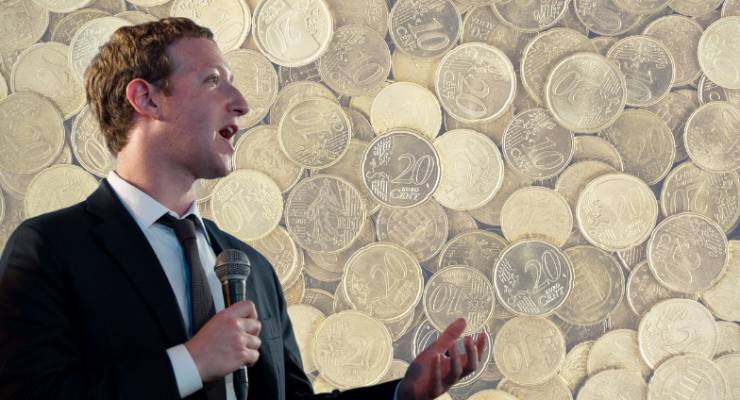
Facebook’s cryptocurrency launched this week. It is called Libra and, as the name implies, promises freedom. Going by Libra’s aims, the currency could do great good in the world. It could also, however, cause destabilising shifts in power.
For the poorest
Libra appears to be aimed at the unbanked — the billions of people in the world without access to financial services. The UN estimates 2 billion adults have no bank account and argues remedying this is a crucial part of the fight against global poverty.
Facebook appears to be coming to the rescue: “Large swaths of the world’s population are still left behind — 1.7 billion adults globally remain outside of the financial system with no access to a traditional bank, even though one billion have a mobile phone and nearly half a billion have internet access.”
In this understanding of Libra, the coin is not really aimed at Australians at all; it’s pitched to the world’s neediest. The promotional video released to launch Libra references Manila, Lagos and Mexico City.
Such an invention could truly be helpful. The flows of payments that go from migrants back to their relatives in the developing world are enormous. Money transfer company Western Union has an outsized share of these flows, and it charges handsomely. Anyone who undercuts them is doing a great thing.
The facts about Libra
While Libra is being described as Facebook’s cryptocurrency, the social network giant just took the lead in developing it. Libra is now owned by a collective called the Libra Association. It includes payment processors like Mastercard and Visa, technology companies like Uber and Spotify, venture capital firms and even a few non-profits. But, interestingly, no banks.
As a digital currency, Libra is somewhat akin to Bitcoin and functionally similar to any currency that is accepted online. A unit of Libra is created when someone buys one using real money. That money is invested by the agency that creates Libra, so every Libra that exists is backed by real assets and can be redeemed for real assets later.
The Libra Association is going to set up a “Libra Reserve” to own those assets, which will be in a mix of major currencies. “The actual assets will be a collection of low-volatility assets, including bank deposits and government securities in currencies from stable and reputable central banks,” says the association.
The earnings from that reserve will pay out as dividends to the founding members of the Libra Association. Those flows may not seem like much in this era of low interest rates and low uptake of Libra, but could become serious money later.
Libra will not appreciate or depreciate markedly compared to those major, low-inflation assets. But it could appear to appreciate markedly if you own Argentine pesos or any other currency experiencing rapid inflation. In this way Libra would be a good protection against hyperinflation for citizens of those countries. If they can access it, that is.
Unlike Bitcoin, Libra will not rely on “proof of work” — energy intensive cryptographic processes — to validate transactions, so it should be greener. It will also have much more ability to scale and capacity to charge lower fees.
Like Bitcoin, Libra is meant to be pseudonymous, rather than linked to your real identity. But anti-money laundering laws will likely make short work of that. That could make everyone’s full transaction history visible, because Libra says it will make the ledger of transactions public.
“Like many other blockchains, the ledger of transactions on the Libra blockchain will be publicly accessible so that it is possible for third parties to do analysis to detect and penalise fraud,” Libra Association says.
What could go wrong?
Libra is most exciting as a test of whether we have moved into an era where the power of states is so totally eroded that corporations can move in and take over cherished central roles like the creation of currency.
I suspect we have not.
Facebook CEO Mark Zuckerberg may feel powerful, but it is likely he will learn national governments are more powerful still. Governments do what they want. The tiny African nation Eritrea has all but banned the internet entirely. Facebook has many users in India, the Philippines and Brazil, but it can’t be accessed in China. Banning or controlling transactions using Libra — or Zuckerbucks, as they’re being called — is likely in many countries.
The risks of Libra are an important consideration for states whose interests do not align with the US. Most of the founding members of Libra are American and it is unclear how the coin might get caught up in US foreign policy, for example if the US was deploying sanctions.
Would Libra come under pressure to freeze accounts?
In any country where Libra did become a dominant currency, it would be subject to the monetary policies of the first world. That could be highly unsuitable.
In the Eurozone we have seen how destabilising it can be to use one currency and one interest rate across economies of different strengths. Germany’s unemployment rate is 3.1%. Italy’s is 10.7%. A country that ran on Libra could end up importing the monetary policy of the Japanese central bank, which might be totally inappropriate.
The biggest threat of Libra however, might simply be the information that Facebook gains from observing your finances. The value of our private information has never been higher than it is today and it may be unwise to not giving it all away to one entity.
What do you think of Zuckerbucks? Send us your thoughts along with your full name to boss@crikey.com.au








Excellent article Jason. Informative, non-hysterical and filled with a healthy dose of facts. Bravo!
Another far right fundamentalist extremist
I presume it is pronounced Suckerbucks.